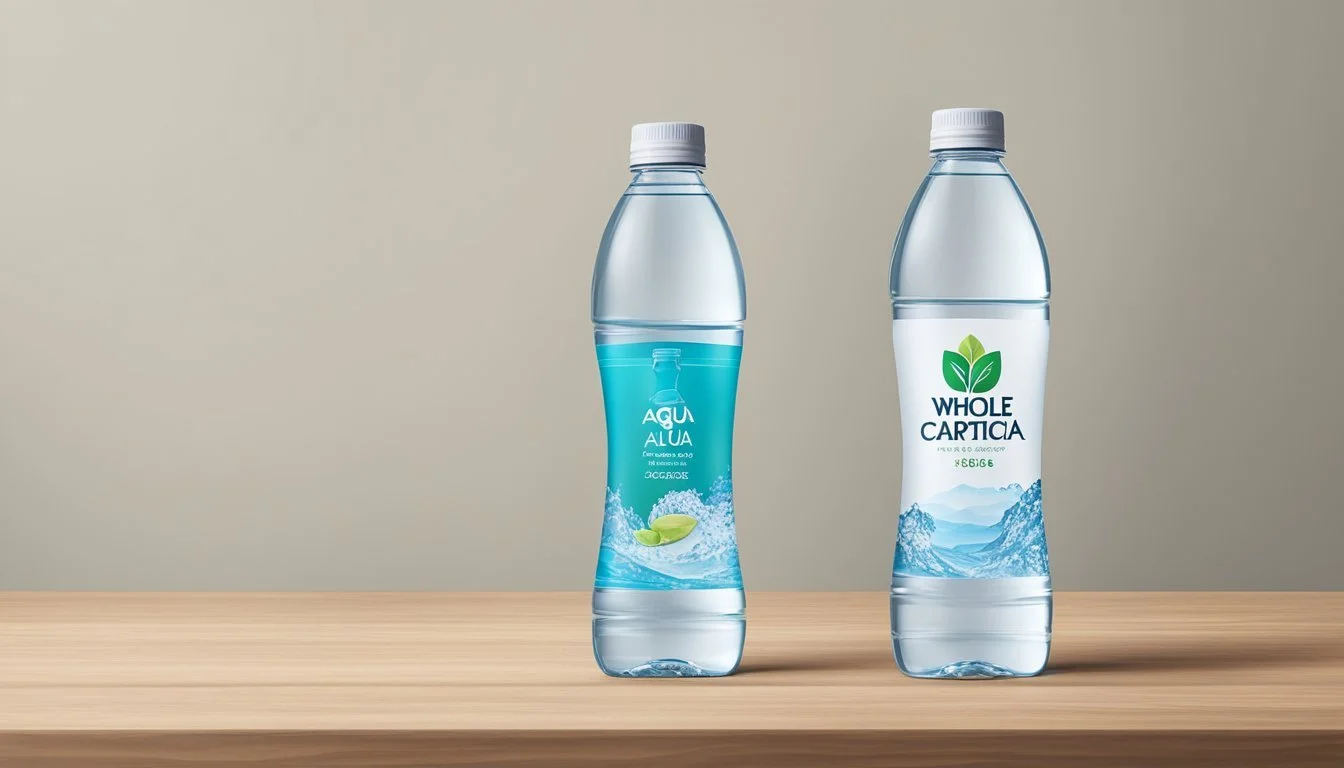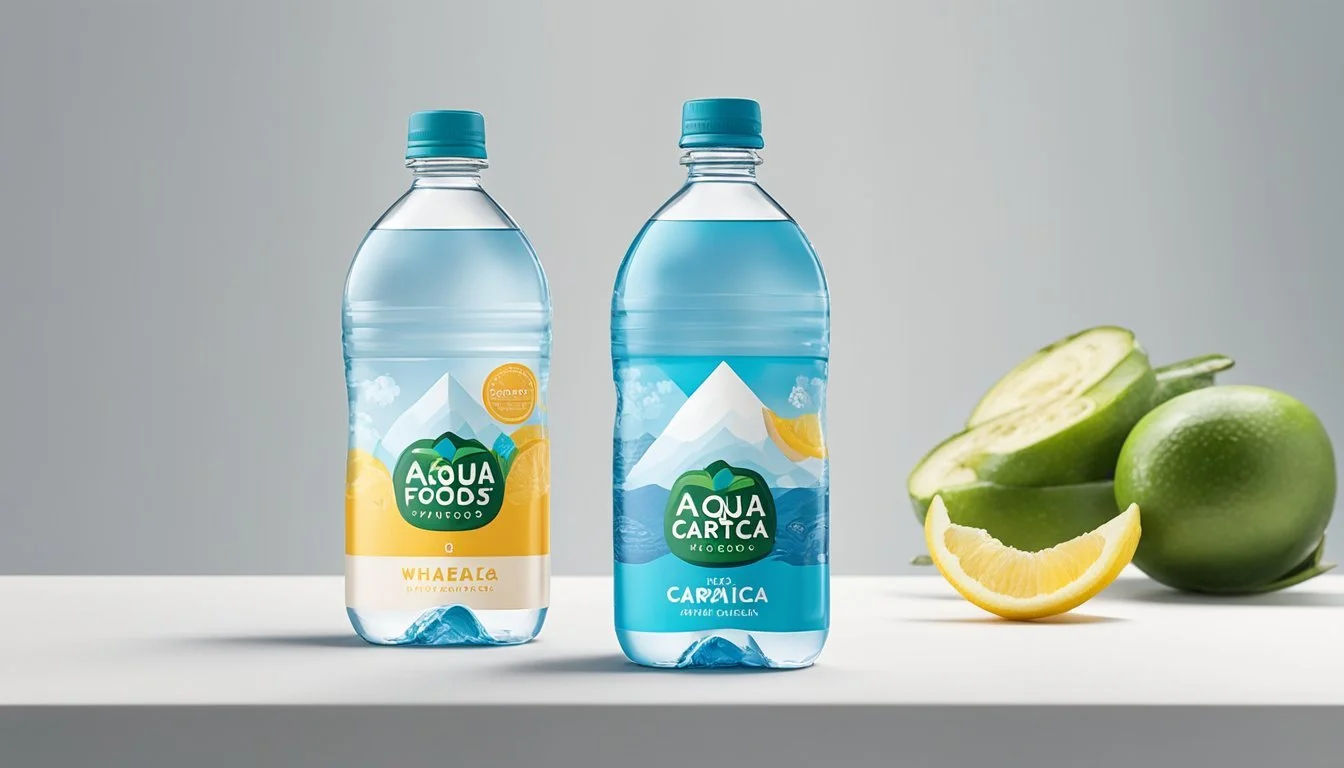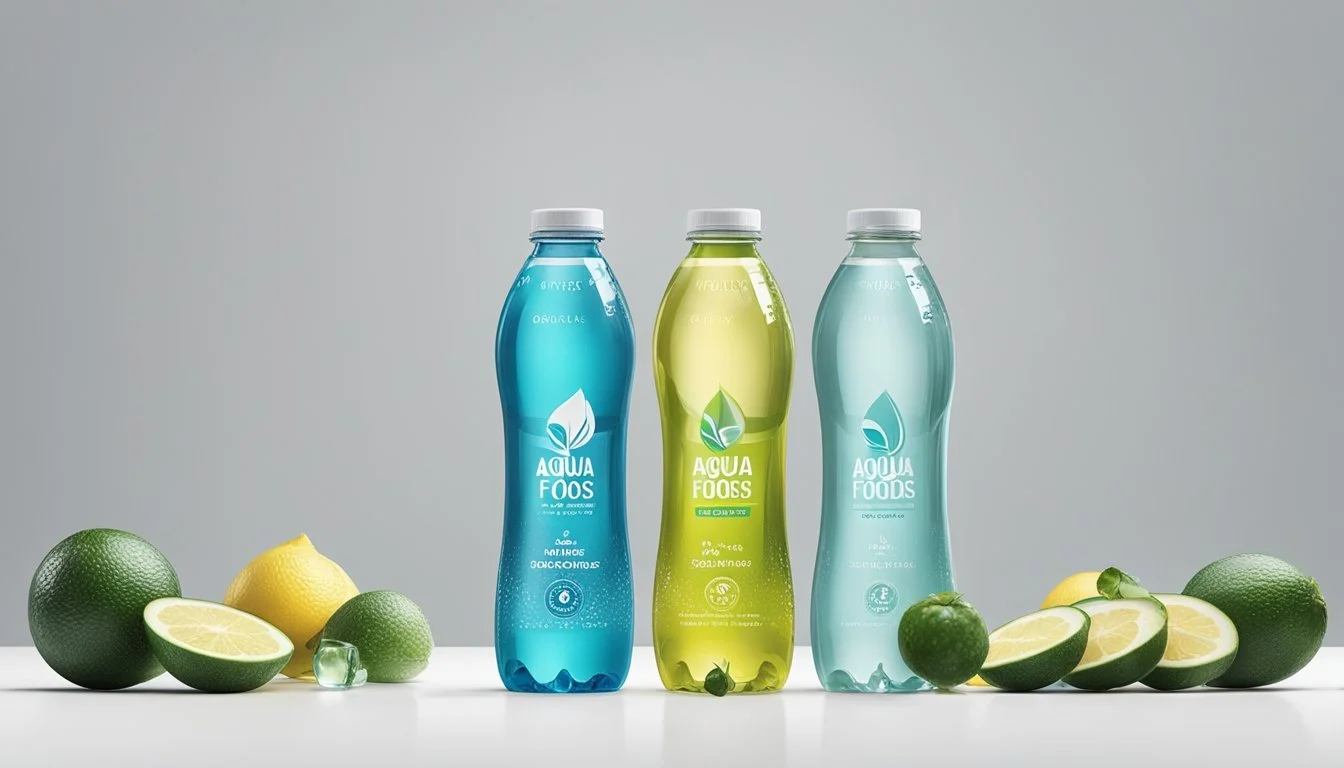Aqua Carpatica vs. Whole Foods 365
Bottled Water Showdown
When it comes to choosing the best bottled water, hydration enthusiasts often debate between two popular options: Aqua Carpatica and Whole Foods 365. Aqua Carpatica stands out for its nitrate-free composition and refreshing taste, making it a favorite among those who prioritize natural purity. On the other hand, Whole Foods 365 offers a variety of bottled water options, including alkaline and electrolyte-infused variants, catering to diverse preferences and dietary needs.
Aqua Carpatica is not only praised for its purity but also for its reasonable pricing, which doesn't compromise on quality. Whole Foods 365 provides convenient access to various types of water at competitive prices, making it a solid choice for everyday consumption. Each brand has its unique benefits and target audience, but consumers are drawn to what's important to them, whether it's natural mineral content or a wide range of options.
While both brands deliver reliable hydration, those looking for a clean and natural option might lean towards Aqua Carpatica. Conversely, Whole Foods 365 presents a versatile range suitable for various hydration needs. Ultimately, the choice between Aqua Carpatica and Whole Foods 365 depends on individual preferences for purity and variety.
Brand Overview
Aqua Carpatica and Whole Foods 365 offer distinct options for bottled water enthusiasts, each with their unique origin and market presence.
Aqua Carpatica: Origin and Brand
Aqua Carpatica originates from the Carpathian Mountains in Romania. This brand emphasizes its natural mineral water, which is nitrate-free and contains low sodium levels. The water is sourced from deep aquifers, ensuring purity and a clean taste. Aqua Carpatica’s commitment to health and natural purity appeals to consumers who prioritize clean, natural beverages.
Their pricing strategy underscores accessibility without compromising quality. For instance, 500ml Still Natural Mineral Water is priced at 65p, catering to health-conscious buyers. Aqua Carpatica markets itself as a premium product without exorbitant costs, emphasizing the natural benefits derived from its pristine source.
Whole Foods 365: Market Presence and Brand Philosophy
Whole Foods 365 is known for its market presence in Whole Foods Market stores. The brand offers various water types, such as alkaline water and natural spring water. Their products cater to a range of preferences, from ionized pH 9.5+ alkaline water to electrolyte water, making it a versatile choice for consumers.
365 Everyday Value Spring Water is particularly noted for its affordability, priced at around $0.79 for 500ml. The brand philosophy revolves around providing quality products at competitive prices, aligning with Whole Foods Market’s ethos of natural and organic offerings. This balance of affordability and quality makes Whole Foods 365 a reliable choice for everyday hydration needs.
Water Source and Quality
Both Aqua Carpatica and Whole Foods 365 focus on delivering quality bottled water, but their sources and quality assurance methods differ significantly.
Aqua Carpatica: The Journey from Carpathian Springs
Aqua Carpatica sources its water from the Carpathian Mountains, a region known for its pristine natural environment. The water undergoes natural filtration through layers of volcanic rocks, providing a high level of purity.
This region is protected from industrial pollution, ensuring that the water maintains its natural composition. The water is free from nitrates and other contaminants, making it one of the purest bottled waters available.
Strict quality controls are in place to monitor the composition and purity of the water regularly. This ensures that every bottle of Aqua Carpatica meets high standards.
Whole Foods 365: Sourcing and Quality Assurance
Whole Foods 365 offers a range of bottled water options, including spring, alkaline, and electrolyte waters. The spring water is sourced from protected areas, often subjected to rigorous quality checks.
For instance, their Alkaline Water is ionized to a pH of 9.5+, believed to offer additional health benefits. The Electrolyte Water is enhanced to support hydration, suitable for active lifestyles.
Whole Foods 365 ensures that their water meets safety and purity standards through regular testing. Protected sourcing areas and meticulous quality assurance practices are key to their product integrity. Each variant is designed to cater to different consumer needs, reflecting the brand's commitment to quality.
Health and Wellness Considerations
Considering the health and wellness aspects of Aqua Carpatica and Whole Foods 365 bottled waters involves examining their electrolytes, mineral contents, hydration, and nutritional facts. Both waters have unique properties that may impact health differently.
Electrolytes and Mineral Contents
Aqua Carpatica offers a rich profile of electrolytes, including calcium, magnesium, and potassium. This makes it beneficial for maintaining electrolyte balance, muscle function, and bone health.
Whole Foods 365, particularly the Electrolyte Water, is designed to replenish lost electrolytes, but its specific mineral content may vary. Typically, these waters contain ions that aid in hydration and recovery post-exercise.
Mineral water, like Aqua Carpatica, helps in maintaining metabolic and physiological functions. Higher levels of calcium and magnesium in natural mineral water support muscle and nerve functions.
Comparatively, while Whole Foods 365 provides essential electrolytes, Aqua Carpatica stands out for its naturally occurring higher mineral content. This benefits individuals seeking a natural source of minerals for better health and wellness.
Comparing Hydration and Nutrition Facts
Aqua Carpatica is marketed as a low-sodium option, which is crucial for those monitoring sodium intake. It ensures hydration without adding to the daily sodium burden, making it a more suitable option for those with specific dietary needs.
Whole Foods 365 waters, like the Spring Water and Electrolyte Water, also offer effective hydration. The nutritional facts often list minimal calories, carbohydrates, proteins, and sodium, making these waters an ideal option for general hydration needs.
Both brands support hydration with additional health benefits. Aqua Carpatica, with its naturally low sodium and rich mineral profile, offers a more rounded approach to hydration and wellness. In contrast, the simplicity of Whole Foods 365 makes it a practical choice for everyday consumption without additional dietary impact.
Taste Profile and Palate
When comparing Aqua Carpatica and Whole Foods 365 bottled waters, the flavor profile and various taste elements are crucial. Both options cater to different palates with their unique mineral compositions and pH levels, which significantly influence their taste and aftertaste.
The Role of pH and Minerals in Flavor
The pH level of bottled water is a significant factor in its taste. Aqua Carpatica boasts a natural alkaline pH level around 7.8, contributing to a smooth and refreshing taste with minimal aftertaste. This slightly alkaline nature makes it more palatable for those who prefer mellow-tasting water.
Whole Foods 365 offers a range of variants, including their alkaline water with a pH of 9.5+. The higher pH level lends a distinct minerality and slight tanginess, which can be polarizing. Their spring water variant features a more neutral pH level, giving it a clean but sometimes dry aftertaste, depending on individual taste preferences.
Minerals such as calcium and magnesium present in both waters further influence the flavor. Aqua Carpatica is rich in these minerals, providing a crisp and slightly sweet finish, while Whole Foods 365 has varying mineral content across its products, affecting the aftertaste.
Expert Opinions and Water Sommelier Insights
Water sommeliers emphasize the importance of mineral content and pH levels in defining the taste of bottled water. Aqua Carpatica, with its balanced mineral composition, is often praised for its pure taste and negligible aftertaste. This makes it a preferred choice in taste tests for those seeking a refreshing and clean water experience.
In contrast, Whole Foods 365 receives mixed reviews. Their alkaline variant is favored by those who enjoy a bold, mineral-rich flavor, while their spring water garners a more modest reception. The spring water's dry aftertaste and slightly sour notes are less appealing to some, reflecting its varied reception among experts.
Overall, both Aqua Carpatica and Whole Foods 365 cater to different tastes, with their unique pH levels and mineral profiles playing pivotal roles in their flavor characteristics.
Packaging and Environmental Impact
Both Aqua Carpatica and Whole Foods 365 have made various commitments to sustainable packaging and environmentally friendly practices. This section will explore the bottle materials and recyclability, as well as the environmental policies and practices of both brands.
Bottle Materials and Recyclability
Aqua Carpatica primarily offers its products in glass bottles, which are widely known for being highly recyclable. Glass can be endlessly recycled without losing quality, making it a sustainable option. However, the weight and fragility of glass can contribute to increased carbon emissions during transportation.
Whole Foods 365 also provides bottled water in both plastic and glass options. While plastic bottles are lightweight and cost-effective, they often end up in landfills or oceans, causing significant environmental harm. Whole Foods claims that their plastic bottles are made of recyclable PET material, yet the effectiveness of recycling these materials depends greatly on local recycling facilities and consumer behavior.
Environmental Policies and Practices
Aqua Carpatica emphasizes minimal environmental impact through the use of natural sources free from contaminants and CFCS. Their bottling and manufacturing processes aim to reduce carbon footprints, in part due to their use of returnable glass packaging.
Whole Foods aims to reduce single-use plastics in its stores but faces criticism for excessive plastic packaging. According to a recent survey, less than 50% of their products used plastic-free packaging. Their commitment is visible in implementing environmentally responsible practices, but the impact is still a work in progress.
Both companies have valid points of action towards reducing environmental impact, but the differences in their packaging materials and execution of policies highlight different challenges and results in sustainability efforts.
Product Varieties and Availability
Aqua Carpatica and Whole Foods 365 offer a range of bottled water options. They cater to diverse preferences and are available through various retailers.
Still and Sparkling Water Options
Aqua Carpatica provides three main varieties of bottled water: Still Natural Mineral Water, Naturally Sparkling Mineral Water, and Forte Intensely Sparkling Mineral Water. Their water is sourced from the Carpathian Mountains, offering pristine quality with low nitrates.
Whole Foods 365 primarily offers Spring Water. While known as spring water, it tends to have a similar taste profile to purified waters, often described as having a sour with a dry aftertaste. This product is competitively priced and caters to both still and sparkling water preferences.
Market Availability and Retailers
Aqua Carpatica is widely available and can be purchased from multiple retailers, including Ocado, Amazon, Harrods, and Whole Foods Market. Recently, it has also become available at Tesco, increasing its accessibility to consumers.
Whole Foods 365 bottled water is prominently sold at Whole Foods Market locations. It is often highlighted for its affordability and decent quality for the price, making it a staple offering within the store's wide array of products.
Both brands offer convenient purchasing options, ensuring that customers can easily find and enjoy these bottled water varieties.
Price Comparison and Value
Comparing Aqua Carpatica and Whole Foods 365 bottled water reveals differences in price and available volume options. This analysis looks into cost per unit volume and available bulk purchasing offers to determine where buyers can find the best value.
Cost Analysis by Volume
Aqua Carpatica offers a 500ml Still Natural Mineral Water for 65p and a Naturally Sparkling version for 69p per 500ml bottle. This makes it relatively affordable considering its nitrate-free benefits.
Whole Foods 365 has a broader range of water types. For instance, their 1L Alkaline Water costs $1.29, while their 500ml Electrolyte Water is priced at $0.79.
Here's a comparison:
Brand Type Volume Price Aqua Carpatica Still Natural Mineral Water 500ml 65p Aqua Carpatica Naturally Sparkling Water 500ml 69p Whole Foods 365 Alkaline Water 1L $1.29 Whole Foods 365 Electrolyte Water 500ml $0.79
In terms of cost per 500ml, Aqua Carpatica's still water is cheaper than Whole Foods 365's Electrolyte Water, but slightly more expensive than their spring water.
Subscription Services and Bulk Offers
Whole Foods Market offers frequent sales and discounts on bulk purchases. Additionally, their products are readily available in-store and online, with potential savings for Amazon Prime members.
Aqua Carpatica is also available online, often through Amazon, which can offer subscription discounts, reducing the cost per bottle if purchased in larger quantities.
For instance, a 12-pack of Aqua Carpatica can provide savings per unit when bought in bulk compared to individual purchases. Whole Foods 365 also features similar bulk offers, making it competitive for cost-saving strategies.
Ultimately, both brands provide opportunities for savings, particularly for consumers purchasing in bulk or subscribing to regular deliveries.
Consumer Reports and Testimonials
Consumer opinions and expert evaluations provide critical insights into the quality and safety of Aqua Carpatica and Whole Foods 365 bottled waters by examining ratings, health impact, and overall wellness.
Online Reviews and Ratings
Aqua Carpatica often receives high praise for its clean taste and perceived health benefits. Many consumers on platforms like Amazon and Ocado highlight its purity, citing its naturally high mineral content and low sodium levels.
Whole Foods 365 is well-regarded for its affordability and sustainability practices. Reviews on Whole Foods' official website and Amazon emphasize its refreshing taste and eco-friendly packaging. Ratings for both waters vary, but Whole Foods 365 generally holds a slight edge due to its accessible price point.
Case Studies and Health Impact
In recent Consumer Reports, Aqua Carpatica has been noted for its minimal contaminants, including low levels of PFAS chemicals. This has made it a favored choice among health-conscious individuals and those with specific wellness needs, such as pregnant women.
Whole Foods 365 also performed well in tests, showing compliance with EPA standards for safe drinking water. Although it contains trace amounts of PFAS, the levels are within safe limits.
The health impact of both brands appears positive, with consumers reporting general wellness and satisfaction. Specific case studies suggest Aqua Carpatica is preferred for those seeking higher mineral content, while Whole Foods 365 appeals to those prioritizing cost-effectiveness and environmental impact.
Legal and Safety Standards
The legal and safety standards for bottled water are designed to ensure quality and protect consumers from harmful contaminants. Both Aqua Carpatica and Whole Foods 365 adhere to these standards through certifications, compliance, and specific filtration processes.
Certifications and Compliance
Aqua Carpatica and Whole Foods 365 must meet various regulatory requirements. Aqua Carpatica adheres to European Union regulations and is certified as nitrate-free mineral water. This signifies rigorous testing and compliance with EU safety standards.
Whole Foods 365 meets U.S. Food and Drug Administration (FDA) regulations and is certified within the U.S. system. They undergo periodic testing for compliance with safety and quality benchmarks set by federal and state agencies. The brand has also sought certifications for sustainability, ensuring eco-friendly bottling practices.
Contaminants and Filtration Processes
Aqua Carpatica undergoes natural filtration through layers of rock, which helps remove contaminants naturally while preserving beneficial minerals. This water is tested for pollutants like nitrates, heavy metals, and other potential contaminants to ensure it meets strict safety standards.
Whole Foods 365 uses various filtration processes, including reverse osmosis and activated carbon filters, depending on the water type. For example, their Electrolyte Water is filtered to remove impurities and augmented with minerals for taste. Consumer Reports tests have found some bottled water brands, including Whole Foods 365, to have trace levels of PFAS chemicals, raising concerns about long-term safety. Regular testing helps maintain safety and quality.
Both brands prioritize adhering to high safety and quality standards to deliver purified, safe drinking water.
Final Thoughts
When comparing Aqua Carpatica to Whole Foods 365 bottled waters, several key factors emerge.
Quality
Aqua Carpatica emphasizes its nitrate-free natural mineral water, offering both still and sparkling options. Whole Foods 365 provides alkaline, electrolyte, and spring water.
Hydration
Both brands aim to keep you hydrated, but Aqua Carpatica boasts about its mineral content, which may offer additional health benefits.
Price
Aqua Carpatica is reasonably priced, with 500ml bottles ranging from 65p to 69p. Whole Foods 365 waters range from $0.79 for 500ml to $1.29 for a liter.
Health
Aqua Carpatica’s nitrate-free claim may appeal to health-conscious consumers. Whole Foods 365 offers diverse types of water, each catering to different health needs, such as alkaline water for pH balance.









